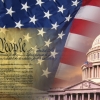Alabama’s legislative chambers are no strangers to controversy, but Republican Rep. Susan DuBose’s latest proposal is stirring up a particularly fervent debate. Her proposed “porn ID law” seeks to erect digital barriers to prevent minors from accessing pornography, a move that represents a significant shift in the Republican stance on the balance between state interference and parental oversight.
Today, politicians frequently discuss “parents’ rights.” However, there must also be a rigorous demand for parental responsibility. When did Republicans decide that state government should raise their children?
DuBose’s advocacy for government intervention where traditionally parents have held sway is contentious. By requiring a government-issued form of ID to view adult material online, the law would not only potentially infringe on privacy rights but also impose the state’s moral compass over the populace, an approach that starkly contrasts with the long-standing conservative principle of minimal government reach.
This tug-of-war isn’t new to the American landscape. The Supreme Court has a long history of distinguishing protected speech from obscenity. The landmark cases of “Memoirs of a Woman of Pleasure” v. Massachusetts and Miller v. California underscore the complexity of regulating material deemed obscene. These rulings demand that any government attempt to regulate this content must be narrowly tailored, ensuring First Amendment rights are not trampled.
The rationale behind the law is grounded in concern, albeit a concern that seems to bypass parental roles and responsibilities. DuBose’s argument is marinated in fear — fear of exposure, fear of addiction, and a rather questionable link to gender identity issues — as she has, without fact, claimed that online porn is causing young girls to identify as transgender. This is not to diminish the genuine worry parents have about their children’s internet consumption, but DuBose’s solution is a heavy-handed approach outside of traditional Republican orthodoxy.
The tension in DuBose’s proposal lies not just in its potential constitutional conflicts but also in its philosophical underpinnings. It signals a broader cultural shift, reflective of a conservative wave looking to harness state power to enforce traditional moral standards. This wave isn’t isolated to Alabama, as seen in similar legislative efforts across the United States.
DuBose’s alignment with the Heritage Foundation and like-minded conservative groups suggests a desire to return to an era of moral simplicity. Yet, the digital age’s complexities make such a return implausible, if not impossible. DuBose’s bill is thus seen by many as a regressive move that could have far-reaching implications on personal freedoms.
The risks associated with mandatory age verification systems extend beyond overzealous paternalism. Such systems could lead to the collection of sensitive personal data, increasing the vulnerability to breaches and misuse. The privacy implications are severe, with the potential for creating a surveillance state under the guise of protecting children.
Critics of the “Porn ID law” argue that it is less about the laudable goal of protecting the young and more about controlling the narrative of morality and decency. This proposed legislation opens up a fraught conversation about who should be the arbiter of such standards — the state or the individual.
Moreover, Alabama’s financial resources are finite, and the state’s readiness to defend its controversial transgender treatment prohibition law already places a strain on its coffers. The potential legal costs of defending another constitutionally dubious law must be weighed against other critical needs.
In her fervent pursuit of moral legislation, DuBose’s intent is clear: to shield the vulnerable. Yet, the shield she proposes raises alarms for its potential to infringe upon the very liberties and privacy rights that define American values.
The broader implications of this debate extend well beyond pornography or free speech; they touch on the core of individual rights versus state control.
No one should want children exposed to pornography, but isn’t that a job for parents or guardians, not the state? When laws present a choice between freedom and government control, the wisest route is freedom.





















































